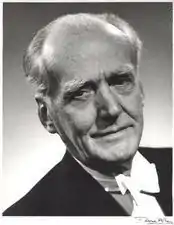Basil Cameron
Career
He was born Basil George Cameron Hindenberg[1] in Reading, Berkshire, England, the son of a German immigrant family. He took up the violin at age 8, and later studied for four years at the Berlin Hochschule.[2] He began his violin career studying with Joseph Joachim and Leopold Auer, later joining the London Symphony Orchestra. In 1912, Hindenberg began conducting at the seaside resort of Torquay. In 1914, at the start of World War I, it was considered less than ideal in England to bear such a Germanic-sounding name as Hindenberg, so the family name was discreetly dropped and he adopted his third name, Cameron, as his professional surname. (Various sources have suggested that the name Hindenberg had initially been adopted because German-sounding conductors could find work more easily than English ones could. It has also been suggested that the name Cameron was his mother's maiden name. Both of these assertions are incorrect.[3]) He led festivals of Wagner and of Richard Strauss with the Torquay orchestra, which brought him to prominence in the English musical scene.
Cameron played an essential role in the immediate post World War II period at the Henry Wood Promenade Concerts held in the Royal Albert Hall where, with Malcolm Sargent, he was responsible for the bulk of the programming, including the Bach/Brahms evening. One notable occasion was on 7 September 1945 when Cameron conducted the first performance in England of Schoenberg's Piano Concerto, with the 23-year-old pianist Kyla Greenbaum as the soloist.[4][5] Despite some underlying hostility the work was received by the audience with unexpected enthusiasm, and (according to The Musical Times) Greenbaum played with "immense courage".[6]
World War I
During World War I, Cameron served in the British Army from November 1915 to August 1918.[2] He had dropped the name "Hindenberg" professionally in September 1914[1] and took a break from his conducting career. After the war, Cameron led orchestras in many other British resorts. Laudatory reviews by George Bernard Shaw and Percy Grainger increased his renown.[7]
Symphony conductor
In 1930 he guest-conducted with the San Francisco Symphony, and was later invited to become its music director, where from 1930 and 1932 he served as joint music director with Issay Dobrowen. In 1932 he moved to the Seattle Symphony.
Return to England
In 1938, he returned to England where he remained for the rest of his career. In 1940, he joined the conducting staff of the Proms as an associate conductor to Sir Henry Wood. He was appointed a Commander of the Order of the British Empire (CBE) in 1957.[8]
Cameron was married twice, first to Frances James, and second to Phyllis MacQueen.[1]
References
- W.L. Jacob, "Hindenburg v. Cameron" (Letter to the Editor) (1991). The Musical Times, 132 (1782), p. 382
- W. McN. [W. McNaught], "Mr. Basil Cameron" (1 June 1931). The Musical Times, 72 (1060): pp. 497–500
- "Basil Cameron - The Quiet Maestro"
- BBC Prom, 7 September, 1945, Royal Albert Hall
- "A Schoenberg Novelty",The Times, 8 September 1945
- Musical Times Issue 1232, October 1945, p 315
- Block, Maxine and Anna Rothe (1943). Current Biography: Who's News and Why, 1943. NY: HW Wilson Co. p. 95.
- Obituary for Basil Cameron, The Musical Times, 116 (1590): p. 731.
